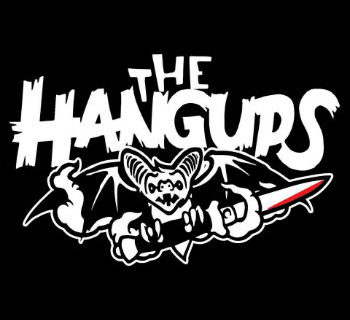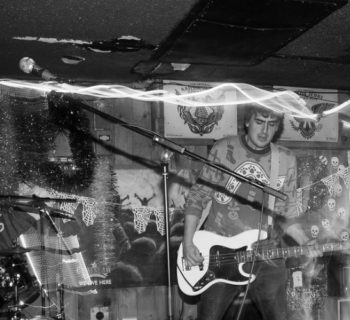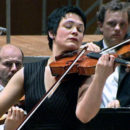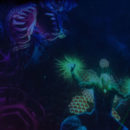Dryjacket is a fairly new name on the indie rock scene, yet their music boasts years of experience. Comprising Joe Junod (guitar/vocals), Brad Wyllner (guitar/vocals), Ian Foley (bass/vocals), and Adam Cerdan (drums), the quartet quickly distinguishes itself from the typical indie rock band. The members come from the bands Ampersand, Exit 34, and Heartwell, bringing in a piece of each’s sound. The result is For Posterity, a powerful debut that combines the energy of a pop-punk album, the experimentation of math rock, and the vulnerability of emo.
In an interview with Washed Up Emo, Foley explains what emo means to the band and how that influences their songwriting:
“The term emo covers a lot of ground for different people, but we kind of pride ourselves in having a mix of the technical aspects of late ‘90s emo bands like American Football, while incorporating the catchy "hook" parts you'd find in a Motion City Soundtrack song. But the label doesn't matter as much to us as we just hope people enjoy the music.”
For Posterity opens with a short ballad called “Wicker Couch.” Junod’s soothing tenor vocals are accompanied by acoustic guitar that takes a backseat to his voice. While it’s unusual to begin a rock album with a soothing ballad, it gives glimpses into the band’s love for emo. Through lyrics like “That summer you left me pacing the perimeter ‘til the morning after,” the songs tell stories, a key element of the album.
The album continues with “Epi Pen Pals,” giving a stronger look into the band’s experimental side. The track begins with a math rock guitar melody that’s just as catchy as it is complex. Already separating from standard verse-chorus-verse songs, Dryjacket continues the track with a short interlude on trumpet. Soon, Junod’s voice joins the track, giving us a nice throwback to ‘90s punk rock; at moments, his voice reminds the listener of Billie Joe Armstrong of Green Day. With palm-muted guitar playing on the verses, the instrumental section of the band allows Junod’s voice to remain at the forefront for the verses.
However, the complex rhythm of Cerdan’s drumming combined with aggressive guitar rhythms add to the energy of the track while the song enters the chorus. Junod’s soothing, yet vulnerable voice allows him to show conviction without taking too much attention away of the song’s more technical aspects. With lyrics like, “Quit making this more difficult than it has been and always will be,” the band is able to continue telling stories through their music.
“Two Toasters” is a more straightforward track. Following a typical verse-chorus song structure, the band shows that they can excel even without relying on technical songwriting. The guitar section of the song is made up of power chords and quiet melodies that linger in the background. Nothing fancy is done here, except for the recurring use of the trumpet, which provides a few notes when utilized throughout the song.
"Misused Adrenaline" captures everything from the band's experimental math rock instrumentation, catchy songwriting, and willingness to be vulnerable.
However, the straightforward nature of the song allows the band to show that they’re just as capable of making catchy pop-punk as they are writing intricate melodies. The drum and bass add to the catchiness of the track, most notable at 2:37 during the song’s outro. Listeners will find themselves wanting to sing along with Junod as he sings, “I re-read the transcript we exchanged for twenty minutes.”
Perhaps the best representation of the album is “Misused Adrenaline.” The song captures everything from the band’s experimental math rock instrumentation, catchy songwriting, and willingness to be vulnerable. It has the high energy of ‘90s pop-punk with the emotion found behind modern indie rock.
The track begins with a series of slow and crisp guitar chords with minimal distortion backed by Cerdan’s drumming, which is punchy yet slow. A few notes on the trumpet soon accompany the guitar. Suddenly, the track speeds up as the guitar ramps up the distortion, and Junod’s catchy vocals resonate with emotion as he joins the track singing, “Our primal instincts getting wasted on impulses we’ve created. And now our welcome is overstayed.”
A minute into the track, Dryjacket pushes for experimentation while still keeping the track catchy. This becomes more apparent as the song showcases more of the math rock elements that Dryjacket implement into their tracks. A minute into the track, the song experiments with different time signatures as it seamlessly switches from one guitar melody to the next. It’s easy to forget that the band is pop-punk until the instrumentation briefly repeats the introduction of the song at around the 2-minute mark of the song.
However, this return to simplicity is short-lived, as the track almost immediately returns to the math-rock elements that make it more interesting, switching between even more time signatures while the guitarists utilize palm-muted riffs on the clean channel. Despite the band’s technical prowess, the song doesn’t lose any of its catchiness. Even towards the very end of the song, the listener will want to sing “Everyone questions everything you stand for” along with Junod.
Overall, For Posterity is a solid debut album from a band willing to take what they love about music and build on it. While they may have a few tricks up their sleeves, Dryjacket is an emo band at heart that’s ambitious to show that their potential extends far beyond the label.
9,250 out of 10,000 Rawckus Kung Fu Throwing Stars













